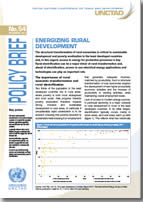
The structural transformation of rural economies is critical to sustainable development and poverty eradication in the least developed countries and, in this regard, access to energy for productive processes is key.
Rural electrification can be a major driver of rural transformation and, ahead of electrification, access to non-electrical energy applications and technologies can play an important role.
Policy recommendation: Initiating rural economic transformation before electrification
Policymakers need to take immediate action in order to foster energy access for rural producers. This requires the adoption of interim measures to satisfy producer energy needs ahead of electrification. Universal access in remote rural areas will inevitably take considerable time, even more than in urban and peri-urban areas.
Awaiting the arrival of electricity before acting to promote rural transformation may stall development in such areas for many years, putting any prospect of poverty eradication by 2030 out of reach. The need for immediate interim solutions is therefore significant.
In the following stage, policymakers can favour stand-alone home systems based on solar or other renewable and hybrid technologies by means of extension services, agricultural policies and rural development programmes.
These may unlock less transformative opportunities for productive energy uses, yet can provide enough power to support lighting, simple productive appliances and information and communications technologies.
With regard to other purposes – for example, motive and mechanical energy, product and space heating and product cooling – the needs of many rural producers can also be met through non-electrical energy technologies such as improved biomass and solar stoves, ovens, kilns and water heaters; solar drying tunnels; animal traction, wind-powered or hydraulic pumps; waterdriven equipment for food processing; and evaporation fridges.
Sectoral and industrial policy measures can stimulate the local production of such appliances within rural communities. Given their relatively limited technological sophistication and the need for tailoring to local needs, many such products offer opportunities within rural communities, as well as for frugal innovation to better adapt the technologies to the local context.
By promoting such production, rural development strategies can help prepare the ground for electrification, by establishing viable enterprises able to take full advantage of access to electrification when it is realized.



